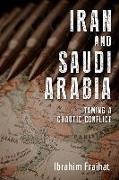Read more
Hostile relations between Iran and Saudi Arabia are partially responsible for the political instability plaguing the Middle East. This book argues that rapprochement between Tehran and Riyadh is possible and it sets out a realistic agenda for managing their intractable conflict.
Ibrahim Fraihat interviewed over sixty scholars, policy makers, think-tank experts and activists to gain an clear, all-round view of Iran-Saudi relations since the invasion of Iraq by US troops in 2003. His research shows that effective peacebuilding would be achievable if the participating countries integrated their diplomatic efforts on three levels: government, Track Two and grassroots.
The result is a fresh perspective on a dangerous and unpredictable rift that affects not only its primary parties - Iran and Saudi Arabia - but also the future of the wider Middle East.
Ibrahim Fraihat is an Associate Professor at the Center for Conflict and Humanitarian Studies, Doha Institute. He is the author of Unfinished Revolutions: Yemen, Libya, and Tunisia after the Arab Spring (2016) and co-author, with Megan Bradley and Houda Mzioudet, of Libya's Displacement Crisis: Uprooted by Revolution and Civil War (2015).
List of contents
Acknowledgments
1. Introduction
2. History of Iran-Saudi Arabian Rivalry and Peacemaking efforts
3. Conflict Issues
- Geopolitics and leadership
4. Conflict Management
- Confidence building measures
5. Conflict Resolution
- Restoring the Regional Order's Balance of Power
- Reforming conflict strategies
- Formal Track 1 Government Mediation
- Bottom-up rapprochement
- Peace plans - Gestures of conciliation
- Shia Arab role
6. Conclusion
Bibliography
Index
About the author
Ibrahim Fraihat is an Associate Professor in International Conflict Resolution at the Doha Institute for Graduate Studies. He previously served as senior foreign policy scholar at the Brookings Institution and taught conflict resolution at Georgetown University. He is the author of 'Unfinished Revolutions: Yemen, Libya, and Tunisia after the Arab Spring' (Yale UP, 2016) and co-author of 'Libya's Displacement Crisis: Uprooted by Revolution and Civil War' (Georgetown UP, 2015). His analysis on Middle East politics has also appeared in Foreign Affairs, Foreign Policy, the New York Times, Huffington Post, Newsweek, and Al Jazeera. Graduate of George Mason University in 2006, he is the recipient of the University's Distinguished Alumni Award (2014) for his achievements in the field of conflict resolution in the Middle East. Fraihat is a non-resident fellow at the Middle East Studies Forum at Deakin University in Australia. He consulted for numerous international organization on Middle East affairs like conflict resolution, national reconciliation, national dialogue, mediation, post-conflict reconstruction, and political transitions. @i_fraihat

